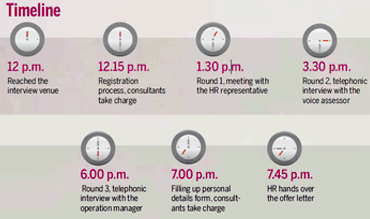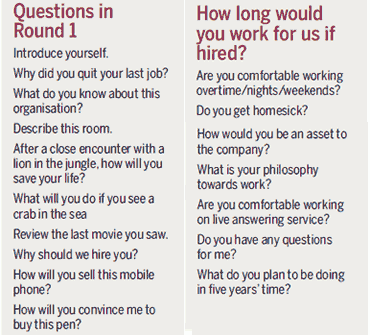
Last week we looked at the top 25 BPO companies to work at in India and the opportunities that exist there. Today, we look at what the interview process entails.
Careers360 correspondent Shiphony Pavithran tried her luck at an entry-level position at one of India's top 20 BPOs. It was a gruelling eight-hour experience. But at the end of it she walked out with an offer letter! The salary: Rs 14,600 in hand. She chronicles her interview experience, which took place in three stages and tips you off on how to be successful.
Location: Gurgaon
Position: Customer Care Executive
Eligibility: You must be a graduate. Freshers, those with non-BPO experience may also apply.
Added advantage: You get the offer letter the same day with fixed salary.
Salary offered: Rs 12, 000 to 16,000 per month (Negotiable for those with work experience)
Working hours: Rotational shifts
After scanning an advertisement by a leading BPO company for a walk-in interview, I did just that; I arrived at 12 noon with my resume, one passport-size photograph and other documents (Class 12 and graduation marksheets).
Upon arrival I was made to sit in the reception hall. A good majority of young, chirpy, excited-looking freshers in casual attire were waiting to be interviewed. Consultants, who were assigned to meet the needs of both employer and jobseekers, helped candidates with the registration and with other recruitment formalities. They busied themselves with answering unending queries from the candidates.
The company's HR team was present to monitor interviews, a marathon which would last four days. By noon, the rush of candidates had become so great that the reception was packed! It was a rigorous process; selected candidates were present in the hall until about 8.30 pm with no food and water.
At the end of each round, the consultant would immediately call out the names of those selected or rejected. The interview time varied for each candidate (10 to 20 minutes). Clearing one round after the other, the majority of freshers moved in and out, confidently.
And finally when the selected candidates were given the offer letters, they just could not hide their glee at landing the job, at a good salary ( Rs 14600+ incentives) in the shortest time possible.

Round 1: Meet the company's HR representative
One by one candidates were called for the first round, and after about one-and- a-half hours my name was called. My chances of moving into other rounds solely depended on the performance in this round. The HR representative started
by asking for my resume and other certificates. After screening my resume she began throwing some typical as well
as tricky questions.
Smart tips: Verbal communication is a very important parameter of the interview. HR people are not expecting long answers but intelligent ones. The questions are designed to measure your logical, creative thinking and problem-solving skills.
Speak with clarity, and offer short, constructive answers. If you have experience, then they might just ask you about your salary expectations right at the beginning. The HR representative tries to find whether you can play a positive role in the company or not.
Round 2: Telephonic interview with voice assessor
I got through the first round! Next, the voice assessor called me on the phone to test my verbal communication and voice quality.
I headed to a quiet place where I could receive the call on the phone. He posed the same pattern of questions as asked in the previous round. Before the interview, I was told that a computer will catch everything you speak over the phone.
In this round, the assessor tried to gauge whether I was a good listener and speaker or not. He asked some questions relating to my interests. The conversation helped them to know my telephonic etiquette followed by accent and pronunciation skills.
Smart tips: This round judges your verbal competency. You must be fluent in spoken English with a decent vocabulary.
No slang, demeaning language during the interview. It could be tough to clear the round, if you speak broken English, which may be grammatically incorrect, or have a regional accent. The girl who sat next to me until the first round was rejected due to her regional accent.
Round 3: Telephonic interview with the operations manager (stability check)
I found some of the questions in this final round, repetitive. The company, which works round-the-clock, examines the psyche of the candidate, especially freshers, to check whether they are serious about the job.
This round tests the emotional stability, attitude and the future plans of the candidate.
Smart tips: You must be clear about what you wish to achieve in life. The interviewee gauges your thought process. Be sure of what you say. You must prove that you are not merely window-shopping at this interview. Every word counts! And remember to see a future in the sector at least until you join.

At 7 pm I was declared selected for the job.
Prior to the offer letters, we were given forms to fill in personal details (postal address, phone numbers, references), and we had to attach photographs too.
We were again called inside for a meeting. A group of four candidates flocked inside the room, the HR representative dished out offer letters to all of us. It comprised terms and conditions of the company (guidelines, induction, joining date, contact details, salary break-up, perks, mandatory documents to be taken on the pre-boarding day).
The take-home salary was Rs 14,600. But to be fair to the company, it did promise to raise the emoluments by another Rs 3,000 depending on my performance. Usually, the compensation is based on the academic, employment history credentials including your prior work experience, the type of industry and compensation offered to you by the previous employer.
At the end, the HR person asked me if I had anything to ask her. I confirmed whether the company offers a pick-up and drop facility. She said "All the details of the same, would be instructed on the induction day," which was to be held five days after the interview.
As the sun went down, hunger pangs hit me hard. The venue was a remote area with no grocery shops in the vicinity!
Smart tip: Carry some biscuits and water with you. Good luck!